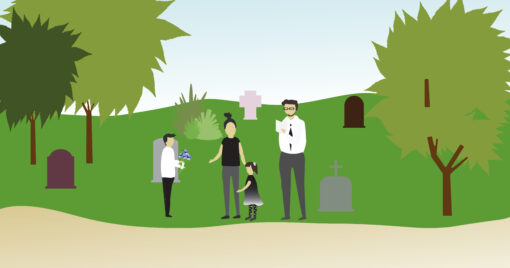
Family/Consumer FAQ
Welcome to the Bereavement Authority of Ontario’s FAQ for families/consumers
Here’s a list of Frequently Asked Questions (FAQ) that our BAO staff regularly receive in phone calls and emails. Many of the answers to these questions and more are also found in our handy and free BAO Consumer Information Guide. See page four to reference the guide’s table of contents.
‘Control-F’ to search by topic
To search for your topic, click and hold the ‘Ctrl’ key on your computer, then click the letter ‘F’, type your keyword(s) and click ‘Enter’. (Click on ‘Command’ + F in Safari Mac browsers.)
For professionals licensed by the BAO, we also have an FAQ page for you.
FAQ for Consumers
– Public/Families
1. Who has the legal authority to make death care decisions?
Generally, the person(s) appointed as the Estate Trustee(s) has the legal authority to make such decisions. Ontario has statutes and common law to determine who may act as the legal representative(s) when a person passes away without a valid will. The ultimate decision maker will be specific to the circumstances of each case but will generally default to a court-appointed Estate Administrator or the deceased’s next of kin. Here is a partial list of who may act as the legal representative:
- Estate trustee, also called an executor or executrix, who is named in the will (or an administrator appointed by the court);
- Spouse;
- Adult children, 18 or older; and,
- Parents of the deceased.
2. I need financial assistance for a funeral or other death care services. Is there any assistance available?
If you do not have enough money to pay for funeral or transfer services, or for cremation, hydrolysis or burial, you may be eligible for assistance from your local Ontario Works office. Financial assistance must be arranged before signing a funeral contract. Your chosen funeral or transfer service provider will have information regarding Ontario Works. The BAO does not provide financial assistance.
Proof of Death (POD)
3. What is a Proof of Death vs. a Death Certificate?
A Proof of Death is not a legal government document, but is provided as a service to clients so they can provide evidence of death (to the Canada Pension Plan, financial institutions, life insurance companies and businesses with which the deceased had dealings).
In some situations a certified Death Certificate is required. A Death Certificate is a legal document issued by the Province of Ontario and can be ordered for a fee, online from ServiceOntario.
4. I’ve been refused a Proof of Death (POD). Shouldn’t the funeral home provide it to me?
POD certificates are not sold by the funeral home to anyone other than the person responsible for the funeral arrangements, who has signed their contract. While customary, funeral establishments are not obligated to sell PODs.
Death Certificates can be ordered for a fee online from ServiceOntario.
Provincial death database
5. I’m trying to find out where a particular person/family member/friend is buried in Ontario. Where can I look for this information?
All deaths in Ontario must be registered with the provincial government, and the place of disposition (cemetery, crematorium, hydrolysis facility) is included in the Death Registration form, which can be obtained online from ServiceOntario.
Please note that:
– The burial location may be found on the long-form death certificate.
– If the decedent was cremated, the place of disposition on the death certificate is usually listed as the crematorium where the cremation took place. Even if the cremated remains were interred (buried or placed in a grave or niche) after the cremation, the place of interment is not typically listed on the certificate.
– The BAO does not maintain a database of all burials in Ontario.
6. I need to find a funeral prearrangement in Ontario. Where can I find this information?
We recommend contacting local funeral homes first. They will be able to tell you if the prearrangement is with them and whether or not it has been prepaid. You may also contact Guaranteed Funeral Deposits of Canada, Funeral Plans Canada and TruStage Life of Canada (formerly Assurant Life of Canada), as they hold the majority of prepaid funds in Ontario. The BAO does not maintain a database of all prearrangements, of pre-arranged/prepaid funerals, burials, cremations or hydrolysis.
7. I have not yet received an expected Canada Pension Plan (CPP) Death Benefit of up to $2,500. What should I do?
Please contact the Canada Pension Plan Death Benefit department for questions related to the Canada Pension Plan Death Benefit, and your application. Please note, the decedent must have worked in Canada and have paid into the plan during their working life to be eligible for the benefit.
8. I want to scatter cremated remains (ashes of the deceased) on Crown land, as permitted by law. How can I confirm what area is Crown land?
You may scatter cremated remains on Crown land and other locations. To confirm whether an area is on Crown land, please visit this Government of Ontario Crown land webpage. Lakes, rivers and provincial parks are Crown land. Please note, municipal restrictions may also affect the locations where scattering cremated remains is permitted. The BAO’s Consumer Information Guide provides information about scattering on Crown land. See page four for the guide’s table of contents.
9. What do I need to know if I want to have a burial on private property?
Burial of human remains, including cremated remains, is not permitted outside of a licensed cemetery. To establish the property as a cemetery an application must be made to the BAO and includes:
- Evidence of Municipal approval;
- A completed application form and supporting documents
- A completed Application for Consent to Establish, Alter or Increase the Capacity of a Cemetery, which is found under the Licence Application section of this BAO forms page
- Establishing a care and maintenance fund with a minimum of $165,000 with a trustee
10. Can I scatter cremated human remains (ashes) in my yard?
On this subject, the Government of Ontario’s website states that in Ontario, you may scatter the remains from cremation or alkaline hydrolysis on:
- “… private property with the consent of the land owner (who can not charge a fee unless the land owner is licensed as a cemetery operator)
-if a land owner wants to allow repeated scatterings to take place on a specific piece of property, the landowner must establish that land as a cemetery and have a licensed cemetery operator for the cemetery … - … Crown land, including land covered by water, if it is unoccupied (for example provincial park, conservation reserve, Great Lakes) and there are no signs or postings that prohibit scattering
- … municipally-owned lands (contact the municipality to check if there are by-laws that prohibit scattering in certain areas such as municipal parks)“
11. I have a problem with an obituary notice. Who do I contact?
If the obituary/death notice was placed on behalf of the family by the funeral establishment, you should contact them for assistance. If you placed the notice yourself, you should contact the publication directly.
Be aware of replicated or ‘pirated’ obituary notices.
12. I need to contact a funeral establishment that has closed. How do I do that?
Funeral establishments that plan to close are required to notify the BAO. Contact our office for information about where the closed establishment’s records are located. Unfortunately, proofs of death are not generally available from closed establishments or an establishment which may be storing the closed establishment’s records. If proof of a person’s death is required, you may order a certified copy of the Death Certificate from ServiceOntario.
Preneed (before death has occurred)
13. (a) What is a prepaid funeral contract?
Prepayment means your funeral is paid upfront for when it becomes needed. Prepaid funeral contracts for services and supplies that you select, with a funeral home or transfer service, are held in trust for when the time comes. Please refer to pages 17 to 22 of the BAO’s free Consumer Information Guide for more information.
13 (b) What do I need to know when a person with a prepaid funeral contract dies?
When a consumer enters into a prepaid contract with a funeral home or transfer service, the money is invested into a trust account or used to purchase an insurance policy which gains interest/growth over time. At the time of death, the amount of the principal payment plus the interest/growth will be used to fund the services and merchandise included in the original prepaid contract. If the total amount of the investment/payout of the insurance policy exceeds the cost of delivering the services, the excess will be refunded by the provider (or with consent be applied to items or services that are added). If the total amount doesn’t cover the costs of the services and merchandise, the provider will not charge the difference. The prices charged must not exceed the prices on the provider’s published price list.
This doesn’t apply to items or services added at the time of death or disbursements which may have been included in the original contract that have increased in cost.
The provider may ask you to sign a new contract for additional items/services or disbursements added at the time of death.
Should you want to cancel all or part of the services included in the prepaid contract, you are urged to review the cancellation clause in the prepaid contract and discuss the potential ramifications to the reconciliation of the services, funds and potential refunds with the provider beforehand.
14. Moving Prearrangements to Another Funeral Home: What do I need to do?
Moving your prepaid arrangements from one provider to another can require a few steps. If the money is held in trust by the first provider, you will need to notify the provider in writing of your intent to cancel the contract. The provider may do one of two things. They may refund the money to you, or they may make arrangements to transfer the money from their trust account to the account of the new provider. You will likely be asked to sign authorization forms either way.
If the money you paid the first provider was used to purchase an insurance policy/annuity, the policy may be re-assigned to the new provider of your choice.
Please note, the new provider will ask you to enter into a new contract and the contract will be subject to the prices of the new provider. It’s best to review the terms and conditions of your existing prepaid contract and those of the new provider before canceling the original contract.
15. I’m struggling with a loss and grief. Where can I turn?
Bereavement counselling is not within the BAO’s mandate, however we do have some suggestions that may assist you. Funeral homes in your area may offer some counselling services or have a listing of local support groups.
Please also review the information on the Centre for Addiction and Mental Health (CAMH) website. CAMH provides some general information on loss, grief, and healing along with a resource list. Emergency crisis resources are also available.
Free support can also be found through Bereaved Families of Ontario.
In addition, at anytime you need to speak to someone right away, contact:
Crisis Services Canada at 1-833-456-4566 Available 24 hours for calls; Plus, they are available for texts at SMS 45645, between 4 p.m. and midnight Eastern Time.
16. Can my pet be buried with me when I die?
Yes, deceased pets can be buried with deceased humans at a human cemetery provided the cemetery bylaws permit this. Cemetery operators write their own bylaws, which must be approved by the Registrar, Funeral, Burial and Cremation Services Act, 2002. The Act itself is silent on pets being buried with humans in human cemeteries. So, the BAO has written a guideline for cemetery operators if the operators want to permit burials of pets with humans. Read the guideline here.
17. What happens to a deceased person’s unclaimed body?
Please read the Unclaimed Bodies section of the website of the Office of the Chief Coroner and the Ontario Forensic Pathology Service.
18. How and where do I make a complaint? (about a funeral home, cemetery, crematorium, hydrolysis facility, and licensed bereavement professionals)
Our Complaints page provides information and a form to file a complaint.
19. What is a green burial?
A green burial, also called a natural burial, is perhaps the most ancient and traditional burial in human history. There is no specific definition of a green burial in the law – the Funeral, Burial and Cremation Services Act, 2002 – as it fits perfectly well within it. A green burial, as has been practiced since long before Ontario or Canada existed, includes an unembalmed deceased human body which may be buried:
- Wrapped in a shroud, at cemeteries which may accept this in their bylaws
(A shroud may be a flexible piece of fabric used to enclose or wrap the body for burial. Cemeteries that accept shrouded bodies for burial may also require a rigid backing board to allow for the safe lowering of the body into the grave); - Marked by natural grave markers such as stones with names chiseled without the use of machinery;
- In a biodegradable casket or container;
- In a designated green section of a cemetery, where grave markers and monuments are not used, and the ground is covered with native species of plants, such as wildflowers instead of grass.
On such cemetery grounds the land may also be restored to its more natural state with gravesites identified by ground markers, rather than headstones.
20. Can funeral processions drive through red traffic lights?
No. They can not go through red lights. Those driving in a funeral procession must obey the law including stopping at red lights, unless there is a police escort with the procession.
21. I was walking today and saw a few headstones or tombstones in an area that was covered by small trees, shrubs, grass, weeds and other vegetation. They looked abandoned. Who should I report this to?
If you notice grave markers in an area that appears to be neglected, please reach out to the BAO at Inspections@TheBAO.ca. Do not move, remove, or otherwise disturb the site. The BAO will work to address the situation so that cemeteries across the province are maintained for safe public access.
Contact us
Got a question we haven’t answered here? Please ask us your question at one of the email addresses on our Contact Us page.



